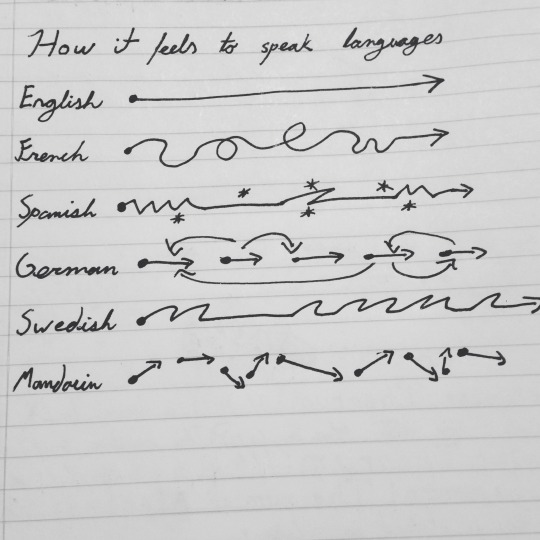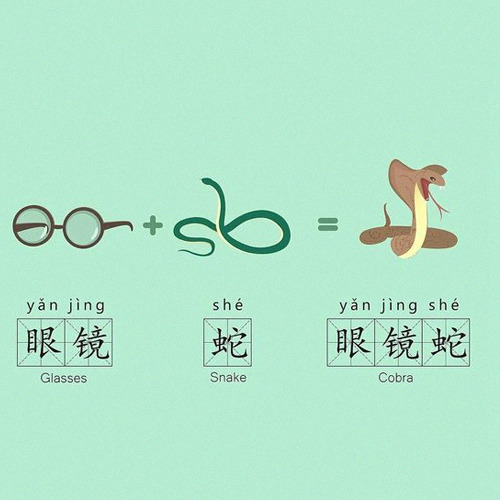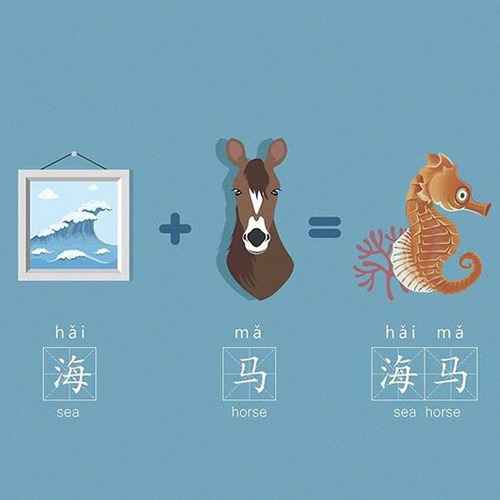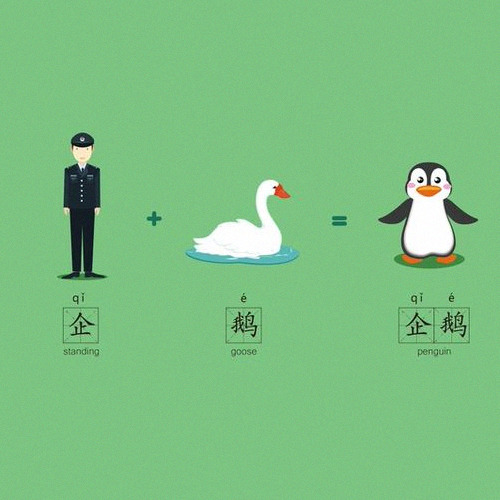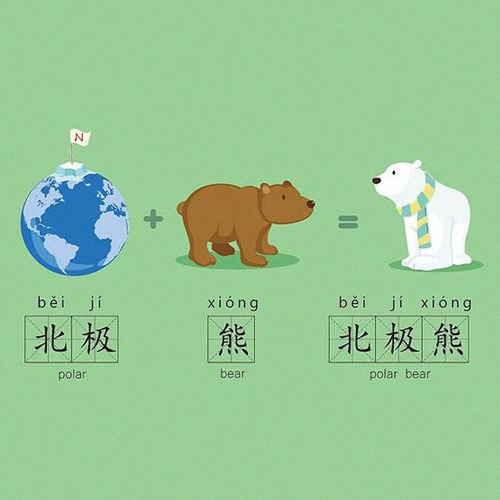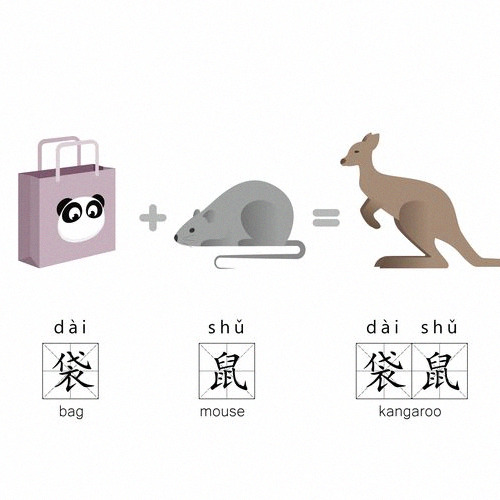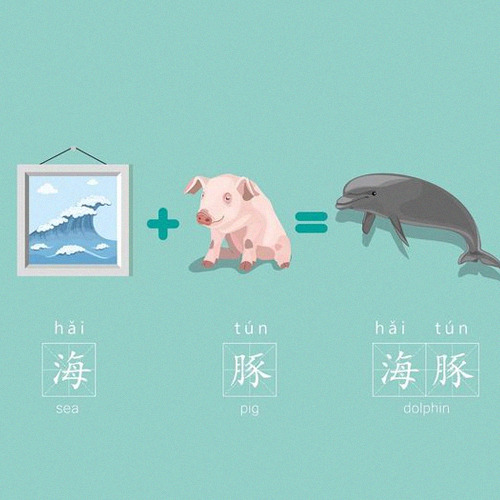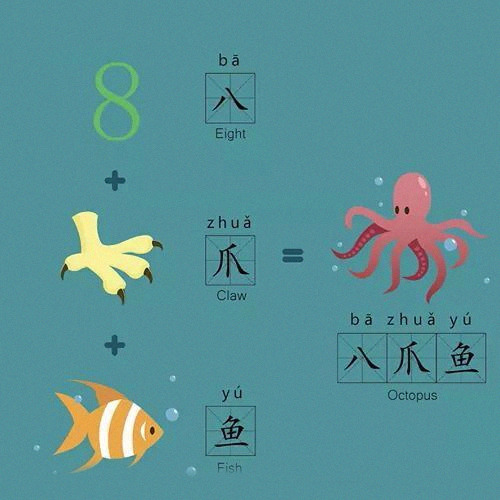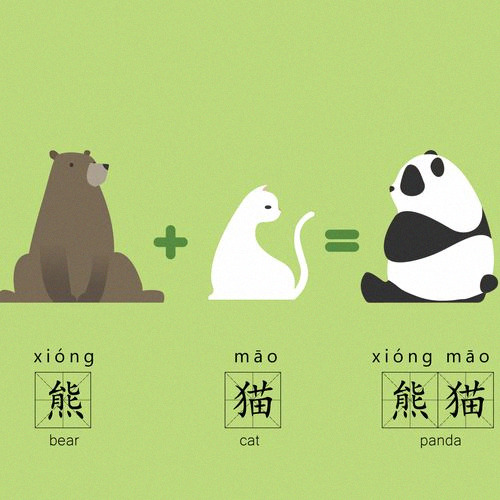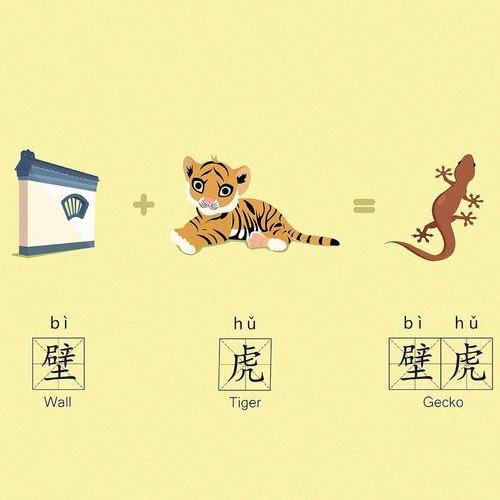Don't wanna be here? Send us removal request.
Text
🇨🇳BEST LEARNING MANDARIN APP ( Reading and listen practice) 🇨🇳


THIS IS THE MOST UNDETERRED CHINESE LEARNING APP THAT I’VE EVER SEEN. Slry I’ve studing mandarin for almost 2y and I was trying to find some immersion activities that were not so boring or difficult and suddenly I met this app and THANK GOD FOR THAT. This has a lot of mangas about daily life, fantasy, love stories, pets, foods, travel and all this history are dubbed in a funny and understandable way that can make you really learn something new every time you read something. Besides this, they also explain some grammar points and some slangs very useful for you. And the best part is that almost all the books are already unlocked!! If you need to unlock some chapter, you just have to win some beans by completing missions and answering questions!!! Trust me, this is one of the best tools for learning!!

If you make a account, feel free to add me (and by putting this invite code you’ll help me win some beans <3) and we can exchange experience and questions!!! Thank you and good studies!!!

939 notes
·
View notes
Photo
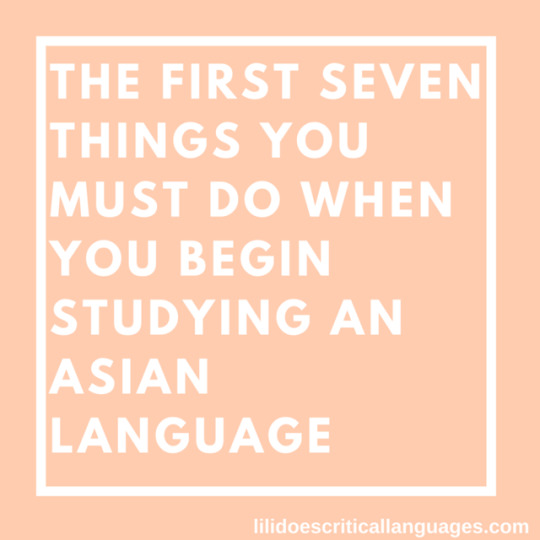
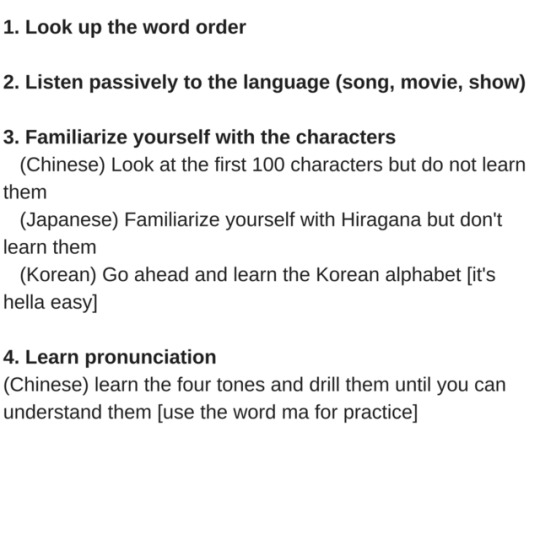
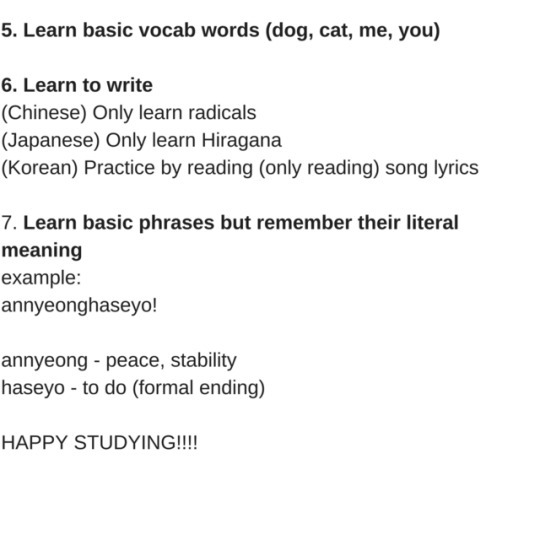
Hey guys, so instead of a long drawn on post, I’ve made an easy to read version of how to begin studying Asian languages through pictures! Yay!!!! Everything is really straight forward and easy but let me know if you have any questions!
7K notes
·
View notes
Text
In Mandarin Chinese we don’t say “Portugal,” we say “葡萄牙 (pútaoyā)” which is meant to sound roughly like a transliteration of the word, but it literally means “grape tooth,” and I think that’s beautiful.
Also for “America” we say “美国 (měiguó)”, which means “beautiful country,” and I think it’s amazing that when the Chinese decided how to call America they thought its beauty was something worthy of being its namesake.
Submitted by @niamshipperthings
279 notes
·
View notes
Text
Mandarin Pronunciation - Finals, Initials
The 6 main/simple finals are:
a [like in ‘father’]
o [said with lips rounded + tight]
e [sounds similar to ‘oo’ in ‘book’ and ‘uh’ in ‘duh’]
i [like in ‘bee’]
u [like in ‘bamboo’]
ü [like French ‘lune’]
There are 29 compound finals to remember:
a = ai [like English ‘I’], ao [like ‘now,’ dragged out], an [like ‘ban’], ang [like ‘song’]
o = ou [like ‘so’], ong [like ‘oo’ in ‘book’ and ‘ng’ in ‘sing’]
e = ei [like ‘hey’], en [like ‘taken’], eng [like ‘taken’, but finishing with a ‘ng’], er [with a hard r such as in American English]
i = ia [like ‘yard’], iao [like pinyin i + ao], ian [like ‘yen’], iang [pinyin i + ang - almost like ‘young’], ie [like ‘yet’], iu [like ‘you’], in [kind of like ‘in’], ing [pinyin i + ng], iong [pinyin i + ong]
u = ua [like ‘wah’], uai [like ‘why’], uan [like ‘wand’], uang [like ‘wong’], uo [pinyin u + o], ui [like ‘way’], un [like ‘one’]
ü = üe, üan, ün
There are 23 initials to remember.
b [like ‘bath’] d [like ‘dad’] g [like ‘gate’] j [not like in English, tongue should be behind lower front teeth and lips should be spread wide] z [like ‘dz’ e.g. kids] zh [like ‘junk’] y [like ‘bee’] p [like ‘pad’] t [like ‘take’] k [like ‘kill’] q [like ‘ch’ in ‘punch’ but with lips spread wide with ee. Strongly aspirate as the tip of the tongue is curled downwards, stuck to the back of the teeth] c [like ‘cats’, ASPIRATE!!] ch [like ‘church’, tongue curled upwards] w [like ‘bamboo’] f [like ‘father’] l [like ‘love’] r [like ‘measure’] m [like ‘mama’] n [like ‘nap’] h [like ‘hero’ but harsher] x [like ‘sh’ in ‘push’ with lips spread on the ‘ee’, tongue downwards and against back teeth] s [like ‘sun’] sh [like ‘shirt’]
(Some basic notes for my own reference [and yours if it helps!] from the brilliant app Hello Chinese!)
120 notes
·
View notes
Text
mandarin grammar: 说不定 shuōbudìng
说不定 literally means “can’t say for certain” and is used to indicate “maybe” or “possibly”
说不定+sentence
Subject+说不定+verb phrase
例子:
说不定过几天我们会去巴���和别的地方旅游。
We might travel to Paris and some other places in a few days.
如果下个星期一有空,说不定我们可以参加美术博物馆。
If we have time next Monday, perhaps we could visit the art museum.
最近他晚上常常睡不着,说不定他的生活太紧张了。
He hasn’t been able to sleep most nights recently. Maybe his life is too stressful.
听说这本书很有意思,说不定我给她买。
I’ve heard this book is interesting. Perhaps I’ll buy it for her.
.
As per usual, please let me know if there’s any mistakes
315 notes
·
View notes
Text


20/10/2018
It’s been a productive study day so far ❤️
(I did not come up with these lists, all credit goes to @woailanguages and @@xuexiblr)
332 notes
·
View notes
Text
Pinyin Pronunciation Table
{Here is a guide to difficult pinyin pronunciation I found in a book on the Chinese government that I will work cite at the end of the post}
As many know, Chinese characters are one syllable long, made up of an ‘initial’ letter and ‘final’ letter that dictates that overall sound of the syllable. With that in mind, here are two tables cover the harder pronunciations in pinyin for ‘initial’ and ‘final’ letters.
Initials:
Pinyin English (pronunciation)
c ts
qi cheek
x hs
z dz
zh jack
Finals:
Pinyin English (pronunciation)
a father
ai bye
ao now
e but
i see (note: after initials ‘ch’, ‘sh’ & ‘zh’,it’s pronounced as ‘r’)
iu yo
ou so
u loot
ua trois (french for “three”)
(note: italicized is equivalent in sound that pinyin makes)
Combination Examples
Pinyin English (pronunciation)
zhou jyo
xi hsee
zao dzow
Work Cited
Lieberthal, Kenneth. “Pinyin Pronunciation Table.�� Governing China: from Revolution through Reform, W.W. Norton, 2004.
A/N: If you have any questions, feel free to drop them on me!
edit: as it’s been brought up, the table’s representation of how to pronounce ‘qi’ is slightly off. A slight ‘t’ in front makes it more authentic and correct. I believe the book compared it to “chee” in cheek because that is the closest representation in English. Nevertheless, ‘tchee’ is more accurate.
500 notes
·
View notes
Text
That Student Of Mandarin Language Feel
you understand all those words separately but not in that sentence
people asking you to “just say something in chinese, anything is fine!”
people asking you what’s their name in mandarin and you have to explain that you have no idea and then they get angry
having to remember all 7642 meanings of 点
you can read whole texts but get panic attacks when someone asks you to write
accidentally offending someone cuz u mispronounced the tone
accidentally saying 不有 instead of 没有 and your teacher looking at you like you just cursed their entire family three
having to explain that cantonese is a different language and that you do not, in fact, speak it
seeing a character with double/triple pronunciation and feeling like stabbing yourself
people asking you to translate other people’s badly done hanzi tattoos
3K notes
·
View notes
Text
In Mandarin Chinese we don’t say “You can do it” as an encouragement, we say “加油 (jia you)” which literally means “Add oil” and I think that’s beautiful.
Submitted by @stopbleepingmeplease
759 notes
·
View notes
Text
In Mandarin Chinese, we don’t say “alpaca” we say “羊驼 (Yáng tuó)” which literally translates to “goat camel” and I think that’s pretty accurate.
Submitted by @npkfertiliser
739 notes
·
View notes
Text
basic mandarin #2: greetings
so from this post on i’m going to be introducing vocab and grammar starting from the beginning
***note: the characters will be typed with simplified characters and then the pinyin and meaning
词汇 cíhuì Vocabulary
我 wǒ I, me
你 nǐ you
您 nín you (polite)
他 tā he
她 tā she
它 tā it
们 men plural suffix for pronouns and some nouns
名字 míngzì name
中文 zhōngwén Chinese language
这 zhè this
那 nà that
叫 jiào to be called
不 bù negative prefix, not
是 shì to be (note: 是 can only be used with nouns; a different word is required for adjectives), yes
很 hěn very
什么 shénme what
谁 shéi who
什么时候 shénme shíhou when
为什么 wèishénme why
呢 ne a final particle
吗 ma a question particle for yes-no questions
老师 lǎoshī teacher
学生 xuéshēng student
先生 xiānshēng Mr.
小姐 xiǎojie Miss***
太太 tàitai Mrs.
早上/上午 zǎoshàng/shàngwǔ morning
中午 zhōngwǔ noon, midday
下午 xiàwǔ afternoon
晚上 wǎnshàng evening
早上好/早安 zǎoshàng hǎo/zǎo’ān good morning
下午好 xiàwǔ hǎo good afternoon
晚上好/晚安 wǎnshàng hǎo/wǎn’ān good evening
好 hǎo good
不错 búcuò not bad, fine
不太好 bú tài hǎo not so good
***since 小姐 is also considered as slang for prostitute, i asked some native speakers for advice and one said if you use someone’s name with 小姐 it’s okay (e.g., 陈小姐 Chen xiaojie) but that you can also use 美女 měinǚ and 姑娘 gūniang as alternatives. all in all, just treat carefully with 小姐
语法 yǔfǎ Grammar
Greeting others
When greeting others, you must address the person first then say the greeting.
陈先生,你好。
Hello Mr. Chen
刘太太,早安!
Good morning Mrs. Liu
Basic Sentence Structure
Like English, Mandarin has a Subject-Verb-Object sentence structure.
他是老师。
He is a teacher
我是学生。
I am a student
When asking a question, you usually can replace a word with the necessary question word.
她是谁?
Who is she?
她是金老师。
She’s Teacher Jin.
你叫什么名字?
What is your name? (literally You are called what name)
我叫雅玲。
My name is Yaling (literally I am called Yaling)
吗 is used to ask a yes-no question
你是老师吗?
Are you a teacher?
我是老师 OR 我不是老师
I am a teacher OR I am not a teacher
呢 ne
If someone asks you a question, you can use 呢 ne at the end of a sentence to make it interrogative. In many cases it functions the same way as “how about…?” in English.
你好吗?
How are you?
我很好,你呢?
I’m well, and you?
so this is it for the second basic mandarin post. i would appreciate any feedback that you have. thanks, and i hope this helps!!
2K notes
·
View notes
Text
In Mandarin Chinese we don’t say “potato”, we say “土豆 (tǔdòu)” which literally translates to “dirt bean” and I think that’s beautiful.
Submitted by @cynicalwindmill
1K notes
·
View notes
Text
In Mandarin Chinese, you don’t call a lame and unfashionable straight boy a “f*ckboy” or “chauvinist”, you say he has “直男癌 (zhí nán ái)” which roughly translates to “straight guy cancer” and I think that’s beautiful.
Submitted by anonymous, with the help of @liu-anhuaming
[reference by @sooloosulu]
3K notes
·
View notes
